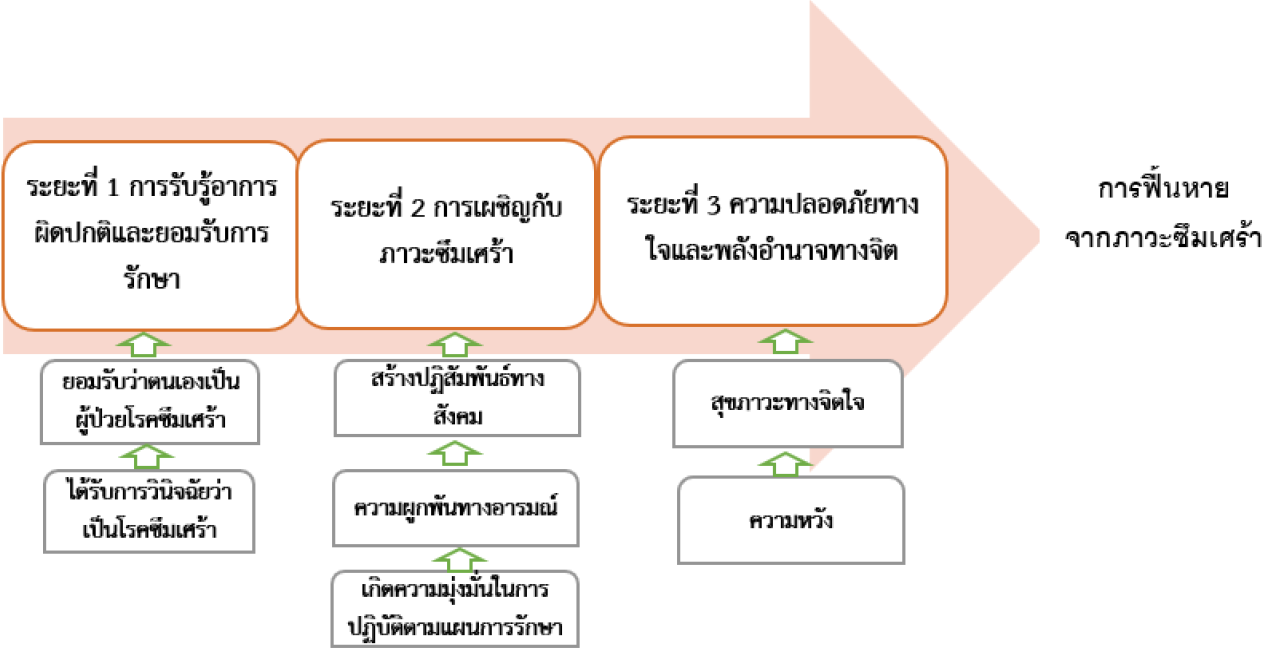กระบวนการฟื้นหายจากภาวะซึมเศร้าในผู้สูงอายุที่มีโรคเรื้อรัง
คำสำคัญ:
กระบวนการฟื้นหาย, ภาวะซึมเศร้า, ผู้สูงอายุโรคเรื้อรังบทคัดย่อ
วิจัยเชิงคุณภาพโดยใช้วิธีวิทยาการสร้างทฤษฎีฐานรากนี้มีวัตถุประสงค์เพื่อค้นหากระบวนการฟื้นหายจากภาวะซึมเศร้าในผู้สูงอายุที่มีโรคเรื้อรัง โดยใช้ระเบียบวิธีวิจัยเชิงคุณภาพแบบการสร้างทฤษฎีฐานราก ทำการรวบรวมข้อมูลด้วยวิธีการสัมภาษณ์แบบเจาะลึกร่วมกับการจดบันทึกเรื่องราว ผู้ให้ข้อมูลประกอบด้วยผู้สูงอายุโรคเรื้อรังที่มีประวัติเข้ารับการรักษาด้วยอาการซึมเศร้า จำนวน 10 ราย และบุคคลสำคัญที่ใกล้ชิดกับผู้สูงอายุโรคเรื้อรังที่มีภาวะซึมเศร้า จำนวน 21 ราย คัดเลือกกลุ่มตัวอย่างแบบเฉพาะเจาะจงตามคุณสมบัติที่กำหนดและตามการชี้นำของแนวคิดที่ค้นพบ เก็บรวบรวมข้อมูลด้วยการสัมภาษณ์เชิงลึกโดยใช้แบบสอบถามกึ่งโครงสร้างและการบันทึกเสียง วิเคราะห์ข้อมูลโดยกระบวนการให้รหัสร่วมกับการเปรียบเทียบข้อมูลอย่างคงที่ ผลการวิจัย พบว่า
กระบวนการฟื้นหายจากภาวะซึมเศร้าในผู้สูงอายุที่มีโรคเรื้อรัง แบ่งเป็น 3 ระยะ เริ่มจากระยะที่ 1 การรับรู้อาการผิดปกติและยอมรับการรักษา และการได้รับการวินิจฉัยว่าเป็นโรคซึมเศร้าจากแพทย์ ซึ่งเป็นปัจจัยที่ช่วยให้ผู้ป่วยเกิดการยอมรับและผ่านระยะนี้ได้ ระยะที่ 2 การเผชิญกับภาวะซึมเศร้า ประกอบด้วย การเกิดความมุ่งมั่นในการปฏิบัติตามแผนการรักษา ส่งผลต่อความผูกพันทางอารมณ์ นำไปสู่สร้างปฏิสัมพันธ์ทางสังคม ซึ่งเป็นจุดเปลี่ยนให้ผู้สูงอายุโรคเรื้อรังที่มีภาวะซึมเศร้าเข้าสู่ระยะที่ 3 ความปลอดภัยทางใจและพลังอำนาจทางจิต ซึ่งเป็นระยะที่ผู้สูงอายุรู้สึกสบายใจและมีความสุขมากขึ้น สามารถกลับไปใช้ชีวิตตามปกติได้ ปัจจัยที่ช่วยให้ผู้สูงอายุเผชิญกับภาวะซึมเศร้าได้สำเร็จและเข้าสู่ระยะความแข็งแกร่งทางจิตใจได้ คือ การมีความหวัง และรับรู้ถึงการสุขภาวะทางจิตใจ
การรับรู้และเข้าใจถึงกระบวนการฟื้นหายจากภาวะซึมเศร้าของผู้สูงอายุโรคเรื้อรัง เป็นแนวทางให้บุคลากรทางสุขภาพสามารถให้การบำบัดแก่ผู้รับบริการในเชิงรุก ส่งเสริมให้ผู้สูงอายุโรคเรื้อรังเข้ารับการดูแลทางสุขภาพจิตในระยะเริ่มต้น ช่วยลดความเสี่ยงของปัญหาทางสุขภาพจิตและโรคเรื้อรัง
ที่รุนแรง
เอกสารอ้างอิง
Anthony, W. A. (1993). Recovery from mental illness: the guiding vision of the mental health service system in the 1990s. Psychosocial Rehabilitation Journal, 16(4), 11-23.
Corbin, J. M., & Strauss, A. (1990). Grounded theory research: Procedures, canons, and evaluative criteria. Qualitative Sociology, 13(1), 3-21.
Craighead, W. E., & Dunlop, B. W. (2014). Combination psychotherapy and antidepressant medication treatment for depression: for whom, when, and how. Annual Review of Psychology, 65, 267-300.
Department of Older Persons. (2023). Elderly Statistics. https://www.dop.go.th/th/know/1 (in Thai)
Eliopoulos, C. (2014). Gerontological Nursing. (8th ed). Philadelphi: Wolters Kluwer/Lippincott Williams & Wilkins.
Goo, S. K. L., Wang, J. B., Yeo, J. M. L., Ong, S. H., & Marimuttu, V. J. (2019). Patient and family perspective on factors that promote recovery in adolescent depression in Singapore: A qualitative study. Asian Journal of Psychiatry, 46, 21–23. doi.org/10.1016/j.ajp.2019.09.020
Hendriks, T., Schotanus-Dijkstra, M., Hassankhan, A., Graafsma, T. G. T., Bohlmeijer, E., & de Jong, J.
(2018). The efficacy of positive psychological interventions from non-western countries:
A systematic review and meta-analysis. International Journal of Wellbeing, 8(1), 71-98. doi.org/10.5502/ijw.v8i1.711
Jitsangob, P. (2017). Recovery experiences of patients with depression diagnosed for the first time. Journal of Mental Health, 23(2), 123-145. (in Thai)
Jorm, A. F. (2012). Mental health literacy: Empowering the community to take action for better mental health. American Psychologist, 67(3), 231-243. doi:10.1037/a0025957
King, R. B., & Caleon, I. S. (2021). School psychological capital: Instrument development, validation, and prediction. Child Indicators Research, 14(1), 341-367.
Krause, M., & Behn, A. (2021). Depression and Personality Dysfunction: Towards the Understanding of Complex Depression. In Depression and personality dysfunction (pp. 1-13). Springer, Cham.
Mandolikar, R. Y., Naik, P., Akram, M. S., & Nirgude, A. S. (2017). Depression among the elderly:
A cross-sectional study in an urban community. International Journal of Medical Science and Public Health, 6(2), 318-323.
Phormpayak, D., Saenyos, J., Makorn, H., & Chansong, Y. (2024). The Development of a Health Literacy Enhancement Programfor Newly Diagnosed Patients with Type 2 Diabetes. The Southern College Network Journal of Nursing and Public Health, 11(3), e271083. (in Thai)
Phothisita, C. (2007). The Science and Art of Qualitative Research (3rd ed.). Bangkok: Amarin Printing and Publishing. (in Thai)
Polit, D. F., & Beck, C. T. (2006). The content validity index: are you sure you know what's being reported? Critique and recommendations. Research In Nursing & Health, 29(5), 489-497.
Richardson, K., & Barkham, M. (2020). Recovery from depression: A systematic review of perceptions and associated factors. Journal of Mental Health, 29(1), 103-115.
Seeherunwong, A. Boontong, T. Sindhu, S. & Nilchaikovit, T. (2002). Self-regaining from loss of self: A substantive theory of recovering from depression of middle-aged Thai women. Thai Journal Nursing Research, 6, 186-99
Singer, M. Bulled, N. Ostrach, B. & Mendenhall, E. (2017). Syndemics and the biosocial conception of health. Lancet, 389(10072), 941–950. doi.org/10.1016/S01406736(17)30003-X
Van Dooren, F. E., Nefs, G., Schram, M. T., Verhey, F. R., Denollet, J., & Pouwer, F. (2013). Depression and risk of mortality in people with diabetes mellitus: A systematic review and meta-analysis. PloS One, 8(3), e57058.
World Health Organization. (2016). Mental Health and Older Adults [Internet]. Geneva: World
Health Organization. Retrieved May 20, 2024 from http://www.who.int/mediacentre/ factsheets/fs381/enl
Zenebe, Y., Akele, B., W/Selassie, M., & Necho, M. (2021). Prevalence and determinants of depression among old age: A systematic review and meta-analysis. Annals of General Psychiatry, 20(1), 55.

ดาวน์โหลด
เผยแพร่แล้ว
ฉบับ
ประเภทบทความ
สัญญาอนุญาต
ลิขสิทธิ์ (c) 2024 วารสารเครือข่ายวิทยาลัยพยาบาลและการสาธารณสุขภาคใต้

อนุญาตภายใต้เงื่อนไข Creative Commons Attribution-NonCommercial-NoDerivatives 4.0 International License.
1. บทความหรือข้อคิดเห็นใด ๆ ที่ปรากฏในวารสารเครือข่าย วิทยาลัยพยาบาลและการสาธารณสุขภาคใต้ ที่เป็นวรรณกรรมของผู้เขียน บรรณาธิการหรือเครือข่ายวิทยาลัยพยาบาลและวิทยาลัยการสาธารณสุขภาคใต้ ไม่จำเป็นต้องเห็นด้วย
2. บทความที่ได้รับการตีพิมพ์ถือเป็นลิขสิทธิ์ของ วารสารเครือข่ายวิทยาลัยพยาบาลและการสาธารณสุขภาคใต้







